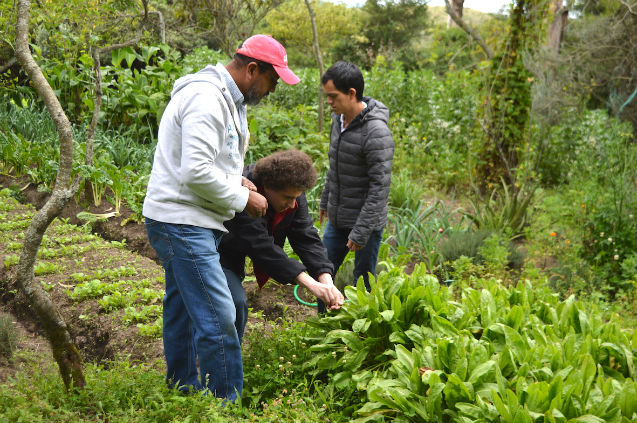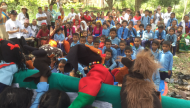“There is a great demand on sustainable seeds”
![[Translate to English:] Two hands holding two different sized seeds](/legacy/_processed_/8/8/csm_200528_Sustainable_Seeds_1_d77147ca89.jpg)
Expert Daniela Borja on the importance and challenges of sustainable seeds in Ecuador.
As part of the IKI project "Farming for Biodiversity", which is being implemented worldwide by the NGO Rare, expert Daniela Borja created two guidelines on the topic of "Sustainable Seeds" for Rare. An interview about the importance and challenges of sustainable seeds.
What are sustainable seeds?
Daniela Borja: According to the Seed Guardians Network, a sustainable seed has several characteristics: They are native, local or creole seeds, coming from inherited material, capable of multiplying life. They are free from intellectual property and exclusively use agro-ecological processes to be produced. Their cultivation is based on traditional techniques, to ensure quality and genetic diversity. The sustainable seeds’ contributions go beyond the use of ancestral techniques and aid in the broader socio-cultural wellbeing, protection of environment, and food security. The different species are chosen are free from debris and plagues and are stored in adequate chemical free conditions. Finally, there is a fair treatment of all people involved in the production process, practicing reciprocity and complementarity.
 What is the importance of sustainable seeds in Ecuador?
What is the importance of sustainable seeds in Ecuador?
Ecuador is part of one of the relevant plant domestication centers around the world. However, a big part of the ancestral knowledge about breeding and keeping seeds has been lost. In the last decades, globalization has introduced new crops to our ecosystems. For these new crops, we do not own the generational expertise on producing the seeds. An example of that is carrots and certain kinds of vegetables. The combination of these two factors created an extreme dependence on the industrial seed and a fragility for producing our crops in an autonomous way.
Given this time of transition and crisis, and for the next transitions to come, achieving seed sustainability is vital for our ability to independently produce our own food. And in turn ensure food security.
Why don’t people today know much about classical seed breeding?
Seed breeding was part of our global ancestral knowledge. Approximately 200 years ago more than 75% of the population grew their own food. With the first industrial revolution, many people started working in factories. At the same time, big machinery was introduced to farms, replacing that rural workforce. For several years until now, the association of governments and agro-industries encouraged through countless mechanisms the use of non-sustainable seeds and agrochemicals for lucrative interests. Recovering our ancestors' knowledge on ecological and biodiverse agriculture is the key to re-establishing our food autonomy. The cultural heritage is as important as the seeds themselves.
What is vital for seed breeding?
For each species, there is a minimum number of plants that cross-pollinate necessary to keep the genetic vigor and produce seeds of good quality. It is also important to maintain high biodiversity in the farm, which assures the quantity and quality of living organisms that help in pollination and the ecosystem health.
Is there a market for sustainable seeds in Ecuador?
During this Covid emergency, we have experienced a great demand for our sustainable seeds. The urban and peri-urban farmers are conscious of how important it is to support ecological seed production, for their own use and for the farmers’ communities. In the rural sector, we work with some NGOs to share the ecological seeds and the knowledge with hundreds of farmers. However, our biggest challenge is communicating the importance to many rural farmers. They need to experience through local and close examples how permaculture can greatly improve their livelihoods, and that involves observing the impact of the production of their own ecologic seeds.
How did you get the idea for the two guides on sustainable plant seeds?
The guides were created based on the feedback the organization received. The Seed Production Guide answers the questions made by several farmers during the capacitation processes the network maintains with them.
While we already dreamed of having a cooking guide of plants that are good for our local environment and people, our consumers have also demanded recipes for preparing the diverse products from the Guardians’ farms.
I am very glad we could publish The Cooking and Cultivating Ancestral Seeds Guide, as part of our Rare - C4C Campaign, that helped us to focus on our main audiences and create the correct strategies for promoting the correct use of these ancestral seeds and their great importance in terms of nutrition and preservation of the land.

Why are you personally involved with sustainable seeds?
I would say sustainable seeds are personally involved with me! While I was seeking for eco-consciousness and commonwealth, the Seed Guardians Network came to my life and opened me to the concept of permaculture and regenerative lifestyles.
Specifically with the Ancestral Seeds Campaign, Javier Carrera, one of the Seed Guardians coordinators proposed it to reintroduce native and sustainable seeds in our diets. I took the Rare - C4C Campaign training with the behavior change and social marketing approach and now we are naming several chefs and cooks as Seed Ambassadors, so they can give a boost to the adoption of sustainable seeds campaign in their own ways.
What was particularly enjoyable during the production of the guidebooks?
It was very pleasant to gather recipes from local farmers and chefs. We could feel a will to collaborate and exchange their knowledge for a greater purpose, encouraging the consumption of native and diverse plants. Personally, as a designer I profoundly enjoy translating the feeling of biodiversity and ancestrally knowledge to graphics.
Are there any plans for other guides?
We are always planning plenty of other guides based on more than 20 years of knowledge of the Seed Guardians. We are developing an illustrated map about the centers of origin of the most common crops we use nowadays. In the next weeks we will publish a basic brochure for cultivating at home. For Spanish speakers, we produce online articles in our magazine www.allpa.org. We encourage our readers to give us a nudge and get involved on www.redsemillas.org.
The link has been copied to the clipboard
Contact
IKI Office
Zukunft – Umwelt – Gesellschaft (ZUG) gGmbH
Stresemannstraße 69-71
10963 Berlin
Guidelines
Seed Saving - an illustrated guide, Englisch (PDF, 3,95 MB)
Guía de Cocona de semillas ancestrales, Spanisch (PDF, 2,85 MB)
Related Publications
-
-

-
10/ 2019 | Guideline
Indigenous cookbook with traditional Mexican recipies
Spanisch | Spanish (PDF, 70 MB)











![[Translate to English:] Dr. Elsa Nickel, Ministerialdirektorin im BMUB; Foto: ©GIZ/Wolter](/legacy/_processed_/e/e/csm_171116_GIZ_PA_0067_Elsa_Nickel_BMUB_310_53e5a7828c.jpg)


